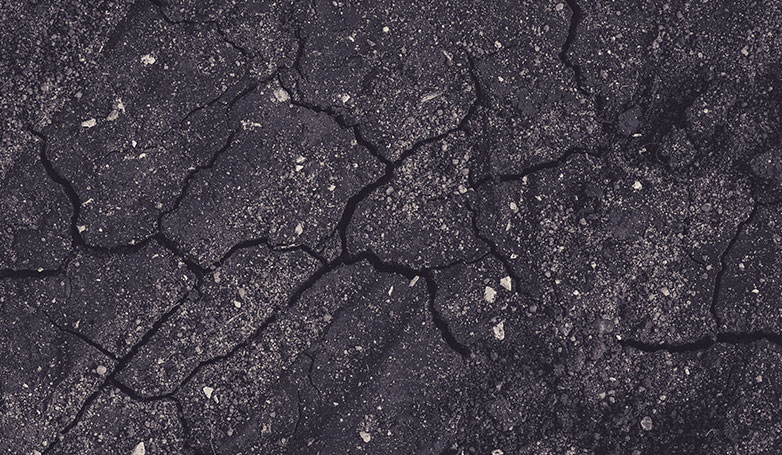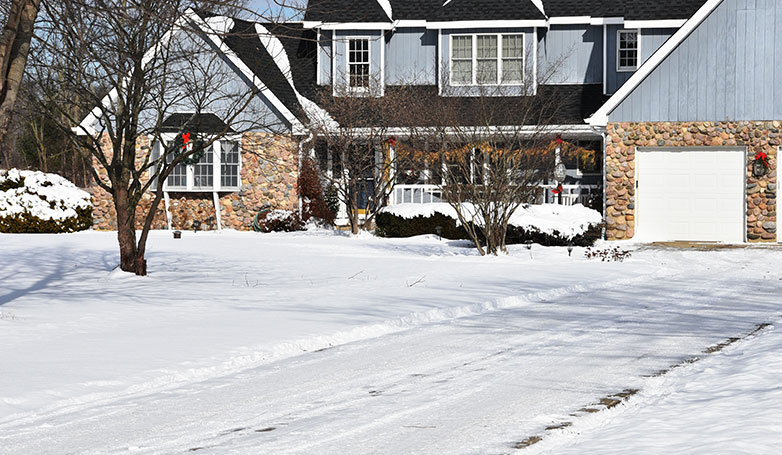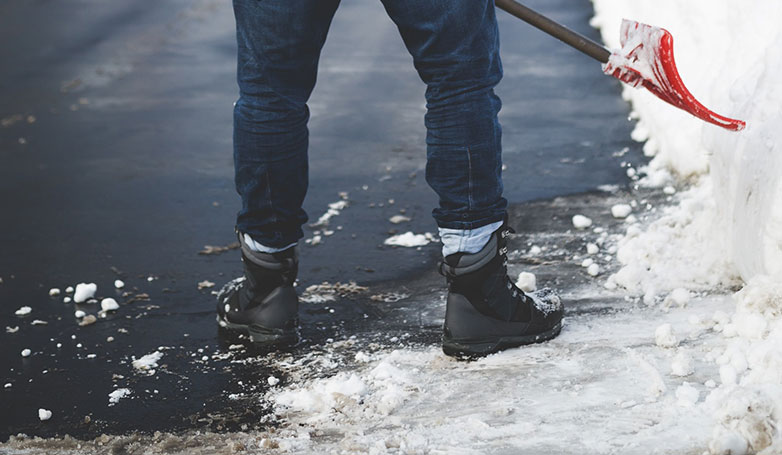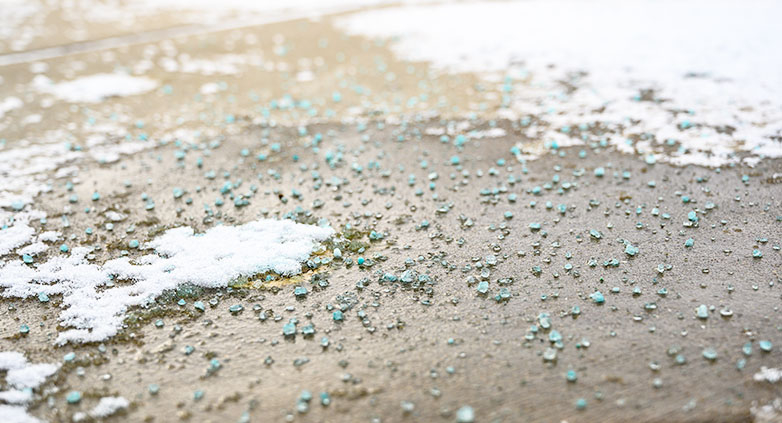Salt For Asphalt Driveways – Will it Degrade Your Property?
As the time approaches the cold and long months of the winter season, you will want to be proactive in all aspects. Including ensuring that your driveway is secured from the icy and snowy conditions accompanying the winter season, making it difficult and unsafe to use your asphalt driveway.
Many homeowners and business owners usually use salt for asphalt driveways as a standard solution to post snowfall and blizzard effects.
Is salt damaging to asphalt driveways?
Salt is widely used in the winter season to manage asphalt pavement; however, many people are worried about its effect on their driveways. The good news is that:
- Salt does not damage asphalt
- Rock salt or other deicers don’t adversely affect asphalt
- Asphalt is designed to withstand all sorts of extreme weather conditions during the winter season, including ice buildup, snowfall, and freezing temperatures.
- Salt can indirectly impact asphalt only when the asphalt is already cracked, partly damaged, or fissured.
It is a popular misconception that using salt for asphalt driveways degrades the driveway. Hot-mix asphalt is made to withstand the freezing and icy conditions of the winter season. Hence, salt would not affect the surface of your asphalt as long as it is installed properly.
However, a salt application can affect other unsealed materials like brick pavement and concrete because the bonds that bind these materials together can be broken down by salt, and they also freeze quicker.
If you are worried that salt will create potholes on your roadway, know that potholes on a driveway are not the direct consequence of salt application. When you observe crackling on your asphalt surface, you should seal it immediately before it is too late.
Potholes are commonly developed by water that gets under the ground surface. During the expansion and contraction of the water, the gravel foundation becomes weakened, and the weight of vehicles is what typically contributes to the development of potholes.
But does driveway salt actually melt ice?
Many people believe that driveway salt melts ice is a misconception because it is not really the case. Putting salt on your driveway does not melt it; instead, it modifies the water chemistry.
Water at 32° F freezes. When you put salt into the water, it decreases the water freezing point, indicating that the water can freeze only at the point it gets to an even lower temperature. Therefore, you should expect to have enough ice left on your driveway if the salt you put on it (irrespective of the quantity) does not lower the freezing point enough.

Pros and cons of using salt for asphalt driveways
People living in environments threatened by snow and ice during the winter frequently turn to salt applications to make it safer.
The many benefits of using salt in the winter are possibly why it has been used ever since and continues to be the most famous deicing material on the market today. It is readily available, inexpensive, and proven to be useful for melting ice and snow.
Although there are benefits of using salt on asphalt and concrete, there are also many disadvantages. Rock salt is a widely used material for this job, but there is a major worry that using salt on asphalt creates hideous and potentially harmful effects.
Therefore, it is worthwhile to make yourself conscious of some of the many adverse effects that come with the use of salt for deicing before applying it to your asphalt driveway.
The pros:
The advantages of using salt for asphalt driveways include the following:
- One of the biggest advantages of applying salt on your asphalt driveways and other paving properties is that it prevents snow and ice buildup. Deicing is critical when you have asphalt pavement in your home.
- In certain situations, preventing the ice from forming on your driveway and roadway will significantly minimize the damage incurred by slipping, falling, or sliding on the ice.
- It is very pertinent to apply salt on your asphalt driveways or parking lots before and after winter to prevent snow and rain from forming a thick layer of ice on them. It also makes it easier to remove the precipitation that falls on your treated surfaces.
- Applying salt to driveways increases asphalt surface friction, making it an extremely efficient way to minimize dangerous and even fatal vehicle accidents on slippery roads in poor conditions.
- Road salt is a practical lifesaver and happens to be pretty inexpensive. Many states use it because it is readily affordable.
- Salt does not degrade asphalt if it is correctly installed for your parking lot or driveways by a professional. Hot-mix asphalt pavement is a mixture of sand, stones, and petroleum combined in quantities to meet the needs of the area being paved. Your asphalt pavement is designed to endure the freeze-thaw cycle and is not influenced by salt or other deicing agents.

Related Articles:
- How long before you can drive on a sealed driveway?
- Gravel Driveway on a Slope
- New Asphalt Driveway Issues
- When Should you Replace Asphalt Driveway
The Cons:
The following are cons involved with the use of salt for asphalt driveways:
- Road salt aggravates the damage to already degraded asphalt as a result of the combination of high precipitation levels, cold winter temperatures, and traffic weight. This is because water saturated with road salt boosts the number of cumulative freeze-thaw cycles. Therefore, road salt can result in potholes under severe cold and on already damaged roads.
- Road salt commonly causes corrosion of vehicle parts. Many vehicle owners park their car in a garage, allowing the snow, ice, and salt to sit and rot away at the car’s building components. This small mistake speeds up rusting and triggers the exhaust and muffler system, piping, coil springs, and frame to suffer harmful effects.
- Due to the chemical composition of road salt, the more your vehicle interacts with it, the rustier it is probably to get. This is because precipitating water places parts of metal cars in close contact with each other. As the free-flowing ions in road salt interact with water, iron oxide formation can be increased by increasing the rate at which it forms. This implies that your car can easily become rusty unless you regularly wax and wash it during and before winter.
- Salt can be hazardous to the environment. While salt helps to prevent accidents related to winter, it does affect the environment. The salt can impact plants, animals, and local wetlands in water runoff. Salt mainly causes dehydration, which results in foliage damage and triggers osmotic pressure that hurts the development of roots.

More Like This:
Rock salt/other deicer alternatives
Due to the many apparent effects of using rock salt for asphalt driveways and other home pavements, many homeowners and even the government are seeking safer alternatives to rock salt as a means of taming winter roads. There are many rock salts substitutes; each has its uses and may not be suitable for every condition.
Below are a list of six rock salt alternatives you may use for your asphalt driveways and other home foot-traffic pavements. These alternatives are not all inherently exclusive, so be free to mix and match and find the option that works perfectly for you.
- Calcium chloride (Cacl)
- Magnesium chloride
- Potassium chloride
- Potassium acetate
- Cat litter
- Snowmelt mats
Calcium chloride (Cacl)
Calcium chloride is a by-product of certain chemical production processes, which is an excellent choice in the country’s sub-freezing areas that are hitting temperatures as low as 24°F. Its properties, especially regarding removing solid ice, enable it to be much more efficient than rock salt. It acts rapidly and works almost instantly, but its snow-melting and deicing capabilities continue to work for up to 24 hours after you apply it on the pavement.
It is necessary to properly store Calcium chloride in plastic or metal bins with lids since it easily sucks up water. Crew handling this product should wear good protective kits like respirators and gloves to prevent its effects on the body.
If you use Calcium chloride properly, it won’t damage plants, but it can leave an oily, slippery trace. And because of this, it may not be the option of preference in and around buildings with high foot traffic rates.
Magnesium chloride
This is another deicer among rock salt substitutes that comes in a liquid solution or granule form. It is environmentally friendly to use around plants, but professionals should not apply it too hugely due to its slippery nature. The granular form sucks up water too easily, so crews should ensure to store it in a dry place and cover it, or it will harden.
Magnesium chloride resembles calcium chloride, but it is potent only down to 1º F (-17.22° C). In comparison, it does not melt ice as quickly as calcium chloride, but it is much more potent than rock salt.
Potassium chloride
Potassium chloride is an all-around right deicer product available in pellet form and shares some fertilizers’ chemical composition. It is suitable for pedestrian areas and performs very well when dealing with temperatures between 10 and 12°F.
Although not exactly perfect, the substance is much less detrimental to the environment around it. Sadly, the price tends to be almost twice that of rock salt, and you need almost double the quantity to cover the same area.
That makes it only appropriate for small properties or coverage areas, particularly for anyone on a spending plan.

See More:
- Cheapest Time of Year to Pave Driveway
- How to Drain Asphalt Driveway Puddles
- Best 20 Driveway Lights
- Plowing on New Asphalt
Potassium acetate
Potassium acetate is an environmentally friendly liquid solution that can be used as an alternative to rock salt to keep snow and ice from developing and sticking to paved surfaces. It is eco-friendly and exists in liquid form. It is recommended that technicians should apply it before a winter storm to achieve optimum efficacy.
Potassium acetate is more efficient and capable of melting snow and ice even at temperatures below 76°F, and as a result, it is the most costly option on the list. It is not a good choice for larger projects, particularly in regards to eliminating snow and ice from long stretches of road.
Cat litter
This rock salt alternative is phenomenally effective when it comes to melting snow and deicing different areas. It is more costly than rock salt, hindering its feasibility for large-scale projects. Still, it is an excellent substitute of rock salt for asphalt driveways and other outdoor pavement that homeowners and property managers can adopt to keep their local areas safe.
The biggest problem with cat litter is that once the snow melts, particularly after the winter seasons are over, it can create a mess.
Snowmelt mats
Snow melting mats are built to be installed on a highly traveled area to help clear away snow, ice, and sleet. They usually have integrated wiring and heating coils to heat the mat and melt away the nearby snow. They are small in size and usually consume energy; hence, they need an active power source, resulting in larger energy bills over the winter.
How to properly use driveway salt
It is not good enough to choose the right salt to use, but it is also pertinent to use the right salt properly to effectively melt the ice and snow without impacting your pavement adversely. Below are a few things to note when using salt for asphalt driveways and other outdoor pavements:
- Spread it evenly to cover as much surface area as possible without using too much.
- Do not apply too much salt to your driveway, as it can cause severe damage to your driveway and lawn soon after the snow melts.
- Clean paws and hands, as many salts are abrasive and can make your skin itchy and red
- Choose the right salt that suits the temperature of the region it is being used.
- Although it may seem like hard work to you, always ensure to shovel the snow before you apply salt to the driveway.

Conclusion:
Whether you are dealing with rock salt or one of its several substitutes, it is necessary to consult a snow and ice specialist. They can get you a cost and product breakdown, product durability, facility requirements, the number of hours required, the amount required for desired results, as well as possible environmental hazards.
In most situations, these products can have a detrimental effect on the pavement surface if you use too much or too little of it, making it dangerous, if not more so.
Furthermore, it is vital to take into account the material you use and the best way to apply it to nearby areas.
Using one of the several alternatives to rock salt for asphalt driveways discussed here eventually means fewer volumes of rock salt being added into the atmosphere and local infrastructure, and that’s better for all of us.


